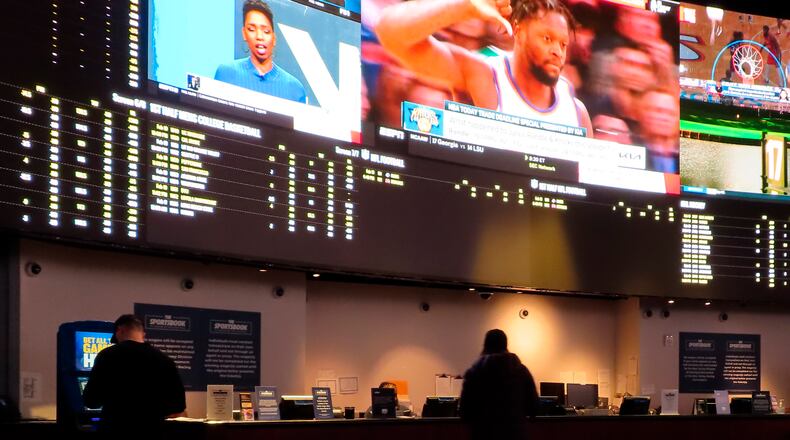Nationally, between 1% and 3% of the general adult population, or over 5.1 million people, experience a gambling problem every year, according to the National Council on Problem Gambling. Additionally, gambling problems are often hidden, and many people may not be aware of them.
Sports betting offers greater access to gambling
With the legalization of sports betting, there will be increased availability and chances for individuals to take part in gambling, particularly with apps on smart phones and local bars and restaurants offering sports betting.
“A lot of people can do it on their phones from their couch,” said Colleen Oakes, manager of the Montgomery County Prevention Coalition. “When you’re in a casino, casino staff is trained to look out for people that may have a problem, gambling disorder or anything like that. Sitting on your couch by yourself, no one’s there to kind of watch out for you.”
There are between 120 and 140 plays in an NFL game, Oakes said, and there is the potential for individuals to bet on each one of those plays. The same thing applies to other types of sports, like pitches in an MLB game. There are more opportunities to participate, but also to lose, which may cause individuals to try to win back their losses.
Looking to other states to prepare
Ohio can look to other states that have already legalized sports betting to gauge what may happen next year following the legalization of sports betting. Oakes said after sports betting was legalized in Michigan and Connecticut, calls to their problem gambling hotline tripled. For Illinois, Pennsylvania, and New York, those hotline calls doubled.
“There’s a couple reasons for that,” Oakes said. Problem gambling could have increased with more accessibility, but legalizing sports betting could have also provided the opportunity for the stigma around it to be lessened. If an individual is doing something illegal, they may not call a hotline for help.
“Stigma is kind of taken away with legalization, so people are more willing to call,” Oakes said. “I think a bigger part of that is just that people are having this experience and calling in to get some help.”
Credit: Wayne Parry
Credit: Wayne Parry
Know the signs of problem gambling
Local agencies providing recovery tools are sharing the signs of problem gambling so more individuals can recognize whether they are developing an issue.
“We also want people to be aware of the problem signs of problem gambling and to be more educated on how to be more responsible,” Roberts said. “Become aware of the warning signs for yourself.”
Some of the signs of problem gambling include:
- Borrowing money to gamble;
- Lying about time or money spent on gambling;
- Betting more over time to feel the same sense of excitement;
- Exaggerating wins and minimizing losses;
- Spending a lot of time gambling or thinking about gambling;
- Hiding bills or debts;
- Becoming irritable when not gambling.
Gamblers can also take a confidential self-assessment quiz to help them understand if they may have a problem at https://www.beforeyoubet.org/the-quiz/.
A gambling addiction can also be a co-occurring issue with substance abuse disorders, and health professionals say genetics and family history are leading risk factors for those disorders. Those with a family history of a gambling and/or substance use disorder can also become aware their genetic makeup makes them more vulnerable to developing a disorder.
“Genetics is one of our top risk factors and one of our top predictors for any sort of disorder,” Oakes said. “Gambling affects our brain the same way that using a substance does. We get that dopamine release, and people feel really good when they do it, and then their body wants that again.”
Know how to gamble responsibly
Gambling also can be done responsibly for entertainment purposes, and health professionals recommend setting time and monetary limits to help keep gambling from becoming a problem.
“The vast majority of people can gamble responsibly,” Oakes said. Oakes and Roberts each recommended setting limits, both with the time spent gambling and the amount of money allotted for the activity. When an individual reaches those limits, they should stop.
Gamblers should also expect to lose and accept loss as part of the game, Roberts said. He also recommended against chasing losses and suggested individuals should treat the money they lose as the cost of their entertainment. Individuals should also only play for fun, not for money and not as source of income.
“Gambling for reasons other than entertainment can lead to problems,” Roberts said.
Oakes also recommended not consuming alcohol when gambling and keeping a clear head.
Credit: Bill Lackey
Credit: Bill Lackey
Where to get help
** The Problem Gambling Network of Ohio’s statewide helpline is 1-800-589-9966.
** Public Health’s Recovery Services program offers free help for gambling disorders, including offering assessments. To schedule an appointment with one of Public Health’s counselors, call 937-461-5223 or visit www.phdmc.org.
** The Montgomery County Prevention Coalition also offers tools on problem gambling and gaming at https://www.preventionmc.org/gaming.
Voluntary exclusion
The state of Ohio also offers a voluntary exclusion program for individuals who want to have themselves banned from casinos. The Ohio Casino Control Commission and Ohio Lottery Commission offers individuals the ability to self-exclude themselves from all Ohio casino facilities for one year, five years, or their lifetime. To enroll, you will be asked to complete the Request for Voluntary Exclusion form in the presence of a trained staff member of the OCCC. Once the request is validated, you are not permitted access to any Ohio casino facility during the length of the self-imposed ban.
Individuals seeking to enroll in the voluntary exclusion program, as well as those seeking to remove themselves from the program, can do so in person at the commission’s offices located at each of the casino properties, as well as the main office at 100 E. Broad St. in downtown Columbus. Remote options are also available. Call 614-387-5854 for more information.
About the Author



